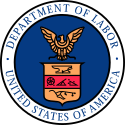Wage and Hour Division
Appearance
 | |
| Agency overview | |
|---|---|
| Formed | 1938 |
| Jurisdiction | United States and it's territories |
| Headquarters | Washington, D.C. |
| Employees | 1,000 |
| Agency executive |
|
| Website | www |
The Wage and Hour Division (WHD) of the United States Department of Labor is the federal office responsible for enforcing federal labor laws. The Division was formed with the enactment of the Fair Labor Standards Act of 1938.[1]
Background
Specifically, the office deals with:
- Recordkeeping
- Youth and special employment
- Fair Labor Standards Act (minimum wage, overtime, child labor)
- Family and Medical Leave Act of 1993 (leave)
- Migrant and Seasonal Agricultural Workers Protection Act (migrant workers, H-2A Visa program, Field Sanitation Provisions of the Occupational Safety and Health Act)
- Employee Polygraph Protection Act
- Worker protections in temporary worker programs
- Davis–Bacon Act, McNamara–O'Hara Service Contract Act, Walsh–Healey Public Contracts Act, Contract Work Hours and Safety Standards Act (prevailing wages, government contracts)
- Consumer Credit Protection Act (wage garnishment)
Until November 8, 2009, the Wage and Hour Division was one of four D.O.L. agencies that were components of the Employment Standards Administration. With the decommissioning of the ESA, Wage and Hour now reports directly to the Secretary of Labor.[2][3]
Wages & Hours - The Highlights
- The standard for the wages and overtime of many private and public employment is determined as per the Fair Labor Standards Act (FLSA). It is administered by the “Wages and Hour Division”.
- All covered, nonexempt employees must be paid the federal minimum wage as well as overtime pay by their employers. The pay should be such that it is one-and-one-half-times usual rate of pay.
- Children under 16 years of age will be allowed to work for a certain number of hours in nonagricultural operations. And students aged below 18 years are banned for employment on too dangerous jobs.
- Children under 16 years of age shall not work during school hours in agricultural operations and take up jobs deemed as too dangerous.
- Labor standards of the Immigration and Nationality Act (INA) is executed by the Wage and Hour Division. The provisions of this Act is applied to aliens employed on the basis of authorised work permit in the United States, as included in some nonimmigrant visa programs like H-1B, H-1B1, H-1C and H2A.[4]

